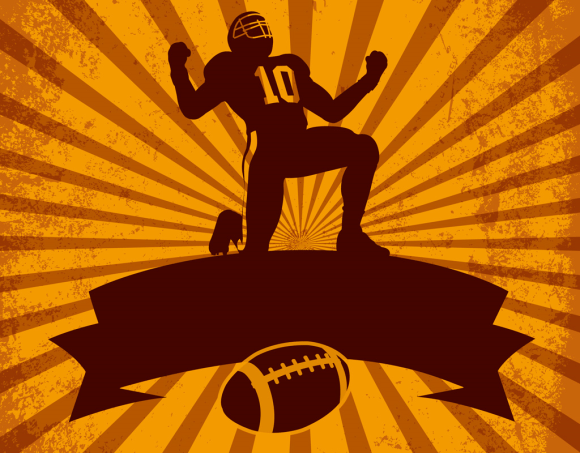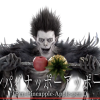
Are you ready for some armor ball?
Nowadays, Japan is pretty accepting of foreign loanwords. For the vast majority of concepts or items that originated overseas, Japanese society is perfectly happy to just pronounce it as best as Japanese pronunciation will allow and write it using katakana, the type of script used for foreign words.
This is especially true for modern sports that were introduced to the country through contact with other nations. In Japan today, tennis is tenisu and soccer is sakkaa. Sure, the pronunciations get a little corrupted, but they’re pretty understandable even to English-speakers without any Japanese-language proficiency.
A high-profile exception, though, is baseball, which in Japan is called yakyuu, literally “field ball” and written with kanji (generally reserved for concepts originating in Japan or China) as 野球. But it turns out that Japan actually created its own words for all sorts of Western sports, some of which are far more colorful than their English counterparts. See how many you can guess from their kanji and literal translations.
1. 籠球
Pronounced: roukyuu
Meaning: “basket ball”
In English:
.
.
.
…basketball, obviously. Sure, the kanji is a little tricky, but the meaning is exactly the same (incidentally there’s also a basketball anime called Ro-Kyu-Bu!).
2. 蹴球
Pronounced: shuukyuu
Meaning: “kick ball”
In English:
.
.
.
…soccer. The baseball substitute known in English as “kickball” is relatively unknown in Japan, making soccer undisputedly the most kick-centric sport in the country.
3. 氷球
Pronounced: kyoukyuu
Meaning: “ice ball”
In English:
.
.
.
…ice hockey, despite the fact that the sport uses a puck, not a ball.
4. 鎧球
Pronounced: gaikyuu
Meaning: “armor ball”
In English:
.
.
.
…football, since it has the most noticeable and iconic protective gear out of the major sports.
5. 闘球
Pronounced: toukyuu
Meaning: “fighting ball”
In English:
.
.
.
…rugby, because no other sport so resembles a running brawl.
6. 庭球
Pronounced: teikyuu
Meaning: “garden ball”
In English:
.
.
.
…tennis, a sophisticated athletic endeavor befitting those cultured enough to also appreciate and maintain a garden.
7. 羽球
Pronounced: ukyuu
Meaning: “feather ball”
In English:
.
.
.
…badminton. Honestly, it’s hard to think of any other way to describe a shuttlecock than as a ball with feathers attached to it.
8. 避球
Pronounced: hikyuu
Meaning: “avoid ball”
In English:
.
.
.
…dodgeball, which in Japan is a team sport played on a square, hardwood court roughly the size of the one used for basketball.
9. 排球
Pronounced: haikyuu
Meaning: “reject ball”
In English:
.
.
.
…volleyball (this is another one that’s a little easier to guess if you’re an anime fan). The theory is that the name comes from a team’s goal being to “reject” the ball by knocking it back to the opponent’s side of the net.
10. 杖球
Pronounced: joukyuu
Meaning: “cane ball”
In English:
.
.
.
…field hockey, in fact, and not croquet, gateball, or any other geriatric-friendly sport.
11. 十柱戯
Pronounced: jucchuugo
Meaning: “ten pillar pleasantry”
In English:
.
.
.
…bowling. It’s not clear why it was given a name that shuns recognition of the bowling ball, but still, it’s hard to hate a name this quaint.
12. 孔球
Pronounced: koukyuu
Meaning: “hole ball”
In English:
.
.
.
…golf, which wasted a perfectly good opportunity to be called “taking a break half-way through to eat lunch and drink a couple cold ones ball.”
Now, bear in mind that while yakyuu remains by far the most common way to refer to baseball in Japanese, all the rest of these names have fallen so out of modern use as to be largely unintelligible, even to many native Japanese speakers. As such, using them on your Japanese midterm is likely to have your frustrated teacher flashing back to that one kid who couldn’t seem to remember that everyone in Japan just uses the loanword for “lion” instead of the indigenous shishi to talk about the African animal. On the other hand, if you want to show off your knowledge of esoteric athletic linguistics to your sports buddies, these will do the trick quite nicely.
Source: Goo via Otakomu
Top image: Gatag/Vector Open Stock
Follow Casey on Twitter, where he admits that he’d probably have written the kanji 鎧球 on the inside of his high school football locker, if he’d only known about them at the time.

 Fox Sports ‘Foul Ball Armor’ Papercraft Helmet Takes Five Hours to Build, Might be Effective at Your Little Brother’s Wiffleball Game
Fox Sports ‘Foul Ball Armor’ Papercraft Helmet Takes Five Hours to Build, Might be Effective at Your Little Brother’s Wiffleball Game Japanese baseball fans disappointed by filthy conditions visiting Major Leaguers left dugout in
Japanese baseball fans disappointed by filthy conditions visiting Major Leaguers left dugout in 119-year-old Japanese high school stops forcing baseball players to shave their heads
119-year-old Japanese high school stops forcing baseball players to shave their heads Japanese baseball player shows us the craziest batting warmup we’ve ever seen 【Video】
Japanese baseball player shows us the craziest batting warmup we’ve ever seen 【Video】 When it comes to blending art and sport, Japanese athletes represent
When it comes to blending art and sport, Japanese athletes represent Viral Japanese cheesecake from Osaka has a lesser known rival called Aunt Wanda
Viral Japanese cheesecake from Osaka has a lesser known rival called Aunt Wanda Potama serves up epic rice balls like no other, and there’s only one store in Tokyo
Potama serves up epic rice balls like no other, and there’s only one store in Tokyo Survey finds that one in five high schoolers don’t know who music legend Masaharu Fukuyama is
Survey finds that one in five high schoolers don’t know who music legend Masaharu Fukuyama is Ramen for 99 yen?!? Best value-for-money noodles found at unlikely chain in Japan
Ramen for 99 yen?!? Best value-for-money noodles found at unlikely chain in Japan Japanese restaurant chain serves Dragon Ball donuts and Senzu Beans this spring
Japanese restaurant chain serves Dragon Ball donuts and Senzu Beans this spring Starbucks Japan releases new sakura goods and drinkware for cherry blossom season 2026
Starbucks Japan releases new sakura goods and drinkware for cherry blossom season 2026 Which convenience store onigiri rice balls are the most popular? Survey reveals surprising results
Which convenience store onigiri rice balls are the most popular? Survey reveals surprising results Ryuk from Death Note performs Pen-Pineapple-Apple-Pen in official release video
Ryuk from Death Note performs Pen-Pineapple-Apple-Pen in official release video Kyoto’s “ikezu” culture of backhanded compliments explained in hilarious souvenir sticker series
Kyoto’s “ikezu” culture of backhanded compliments explained in hilarious souvenir sticker series Starbucks Japan releases first-ever Hinamatsuri Girls’ Day Frappuccino
Starbucks Japan releases first-ever Hinamatsuri Girls’ Day Frappuccino Highest Starbucks in Japan set to open this spring in the Tokyo sky
Highest Starbucks in Japan set to open this spring in the Tokyo sky Tokyo Skytree turns pink for the cherry blossom season
Tokyo Skytree turns pink for the cherry blossom season Japan Extreme Budget Travel! A trip from Tokyo to Izumo for just 30,000 yen [Part 1]
Japan Extreme Budget Travel! A trip from Tokyo to Izumo for just 30,000 yen [Part 1] Yakuzen ramen restaurant in Tokyo is very different to a yakuza ramen restaurant
Yakuzen ramen restaurant in Tokyo is very different to a yakuza ramen restaurant Japan has only one airport named after a samurai, so let’s check out Kochi Ryoma【Photos】
Japan has only one airport named after a samurai, so let’s check out Kochi Ryoma【Photos】 Japanese drugstore sells onigiri at pre-stupid era prices, but how do they compare to 7-Eleven?
Japanese drugstore sells onigiri at pre-stupid era prices, but how do they compare to 7-Eleven? Japan Extreme Budget Travel! A trip from Tokyo to Izumo for just 30,000 yen [Part 2]
Japan Extreme Budget Travel! A trip from Tokyo to Izumo for just 30,000 yen [Part 2] Adorable Totoro acorn key holders come with a special guest hidden inside[Photos]
Adorable Totoro acorn key holders come with a special guest hidden inside[Photos] Japan’s newest Shinkansen has no seats…or passengers [Video]
Japan’s newest Shinkansen has no seats…or passengers [Video] Foreigners accounting for over 80 percent of off-course skiers needing rescue in Japan’s Hokkaido
Foreigners accounting for over 80 percent of off-course skiers needing rescue in Japan’s Hokkaido Super-salty pizza sends six kids to the hospital in Japan, linguistics blamed
Super-salty pizza sends six kids to the hospital in Japan, linguistics blamed Starbucks Japan unveils new sakura Frappuccino for cherry blossom season 2026
Starbucks Japan unveils new sakura Frappuccino for cherry blossom season 2026 Foreign tourists in Japan will get free Shinkansen tickets to promote regional tourism
Foreign tourists in Japan will get free Shinkansen tickets to promote regional tourism The 10 most annoying things foreign tourists do on Japanese trains, according to locals
The 10 most annoying things foreign tourists do on Japanese trains, according to locals Take a trip to Japan’s Dododo Land, the most irritating place on Earth
Take a trip to Japan’s Dododo Land, the most irritating place on Earth Naruto and Converse team up for new line of shinobi sneakers[Photos]
Naruto and Converse team up for new line of shinobi sneakers[Photos] Is China’s don’t-go-to-Japan warning affecting the lines at a popular Tokyo gyukatsu restaurant?
Is China’s don’t-go-to-Japan warning affecting the lines at a popular Tokyo gyukatsu restaurant? Survey asks foreign tourists what bothered them in Japan, more than half gave same answer
Survey asks foreign tourists what bothered them in Japan, more than half gave same answer Japan’s human washing machines will go on sale to general public, demos to be held in Tokyo
Japan’s human washing machines will go on sale to general public, demos to be held in Tokyo Starbucks Japan releases new drinkware and goods for Valentine’s Day
Starbucks Japan releases new drinkware and goods for Valentine’s Day We deeply regret going into this tunnel on our walk in the mountains of Japan
We deeply regret going into this tunnel on our walk in the mountains of Japan Studio Ghibli releases Kodama forest spirits from Princess Mononoke to light up your home
Studio Ghibli releases Kodama forest spirits from Princess Mononoke to light up your home Major Japanese hotel chain says reservations via overseas booking sites may not be valid
Major Japanese hotel chain says reservations via overseas booking sites may not be valid Put sesame oil in your coffee? Japanese maker says it’s the best way to start your day【Taste test】
Put sesame oil in your coffee? Japanese maker says it’s the best way to start your day【Taste test】 No more using real katana for tourism activities, Japan’s National Police Agency says
No more using real katana for tourism activities, Japan’s National Police Agency says Shohei Ohtani called liar after saying he met fan who caught home run ball, but it might be a Japanese translation error
Shohei Ohtani called liar after saying he met fan who caught home run ball, but it might be a Japanese translation error Sports-playing Japanese junior high students at an all-time low, survey finds
Sports-playing Japanese junior high students at an all-time low, survey finds The Japanese language has a special honorific suffix just for talking to athletes
The Japanese language has a special honorific suffix just for talking to athletes Why does Japanese writing need three different sets of characters? (Part 2)
Why does Japanese writing need three different sets of characters? (Part 2) Restaurant in Indonesia’s bizarrely translated Japanese menu commands customers to get stabbed
Restaurant in Indonesia’s bizarrely translated Japanese menu commands customers to get stabbed The thin line between asking a woman why she likes bags and why she likes doggy style in Japanese
The thin line between asking a woman why she likes bags and why she likes doggy style in Japanese Japan’s Kanji of the Year revealed, reflects both the good and the bad of 2022
Japan’s Kanji of the Year revealed, reflects both the good and the bad of 2022 Japan’s Kinki University decides to change its naughty-sounding name
Japan’s Kinki University decides to change its naughty-sounding name Everyday Japanese names that make English speakers chuckle
Everyday Japanese names that make English speakers chuckle Four new era names the Japanese government rejected before deciding on Reiwa
Four new era names the Japanese government rejected before deciding on Reiwa Ridiculous Japanese TV program says English pronunciation is to blame for coronavirus spread【Vid】
Ridiculous Japanese TV program says English pronunciation is to blame for coronavirus spread【Vid】 Japanese park’s English dog turd warning minces no words【Why does Engrish happen?】
Japanese park’s English dog turd warning minces no words【Why does Engrish happen?】 Nine celebrities who speak Japanese… or some variation of it
Nine celebrities who speak Japanese… or some variation of it Japanese netizens give their thoughts on how English has changed the meaning of “senpai”
Japanese netizens give their thoughts on how English has changed the meaning of “senpai” Japan’s new “Cunte” contact lenses aren’t pronounced like you’re probably thinking they are
Japan’s new “Cunte” contact lenses aren’t pronounced like you’re probably thinking they are Japanese Twitter shares the funniest “mysterious Japanese” that they’ve heard from foreigners
Japanese Twitter shares the funniest “mysterious Japanese” that they’ve heard from foreigners